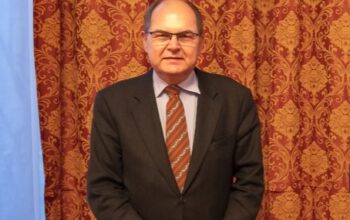The Organization for Security and Cooperation in Europe’s (OSCE) recent analysis of the prosecution of war crimes in BiH reinforces Republika Srpska’s longtime concerns about the nontransparent, political, and biased nature of the BiH Prosecutor’s Office. Judge Joanna Korner of the United Kingdom prepared the analysis at the request of ICTY Prosecutor Serge Brammertz and OSCE Ambassador to BiH Jonathan Moore.
Chief Prosecutor’s Refusal to Cooperate
Judge Korner’s analysis was hindered by lack of cooperation with the OSCE Mission by BiH Chief Prosecutor Goran Salihović. As the report explains, Salihović agreed to cooperate with the analysis, but “notwithstanding his verbal agreement given to both the ICTY Prosecutor and the OSCE Ambassador, co-operation was limited.”[1]
Judge Korner made multiple unsuccessful attempts to persuade the BiH Prosecutor’s Office to cooperate with her study.[2] The High Judicial and Prosecutorial Council (HJPC) approved the OSCE Mission’s access to the Prosecutor’s Office’s documents concerning war crimes cases and threatened sanctions against the Prosecutor’s Office if it failed to cooperate.[3] The Prosecutor’s Office then finally agreed to give the OSCE Mission access to certain files (only those in cases for which indictments had been lodged) and to interview prosecutors. But such interviews had to be in the presence of the Deputy Chief Prosecutor.
Judge Korner observed that “this condition may have inhibited some of those being interviewed from providing completely frank responses . . . .”[4] The Prosecutor’s Office also broke its promise to give the OSCE Mission access to case files.[5] Because of the “refusal by the [Chief Prosecutor] to allow access to investigation files,” it was impossible to examine the evidence that led to indictments.[6]
The OSCE Report highlights the continued lack of transparency in the BiH justice system. This lack of transparency makes it impossible to properly evaluate the fairness with which war crimes are being prosecuted and adjudicated.
Micromanagement by the Chief Prosecutor
The OSCE Report also shows how the Chief Prosecutor has been able to protect Bosniak suspects—and particularly political allies from the SDA—from war crimes prosecution. The Report makes clear that individual prosecutors have no independence and that the Chief Prosecutor micromanages prosecutorial decisions. “When instructed by management to indict a particular person and/or indict for a particular charge,” the report says, prosecutors “do as they are told.”[7] The Report explains:
Notwithstanding the assertions by the [Chief Prosecutor] that “there are no new and old prosecutors, they are all completely equal” and “I do not have the right to tell the prosecutors what to do,” the over-riding impression received, from the vast majority of interviewees, was that the [Prosecutor’s Office] was micro-managed with approval required for any decision whether it related to indictments or more mundane administrative activities.[8]
The Report further explains:
[The Deputy Chief Prosecutor] stated that ‘all indictments are sent to the CP’s office where they are reviewed by him or his closest associates’. She did not elaborate on who were his closest associates and later stated that ‘I do not know for sure who reviews the indictments. I get an approval from the CP.’”[9]
In 2014, the Chief Prosecutor replaced war crimes section heads with prosecutors who had no war crimes experience.[10] This lack of experience, the report notes, leaves them susceptible to pressure from the Prosecutor’s Office’s senior management.[11]
Although the Chief Prosecutor’s noncooperation with the OSCE Mission limited what could be discovered, Judge Korner’s report nonetheless casts light on how the Chief Prosecutor imposes political control on war crimes prosecutions.
Read the full OSCE report here.
[1] Para. 4.
[2] Para. 18.
[3] Para. 18.
[4] Para. 19.
[5] Para. 21.
[6] Para. 6.
[7] Para. 39.
[8] Para. 40.
[9] Para. 54.
[10] Para. 41.
[11] Para 42.


